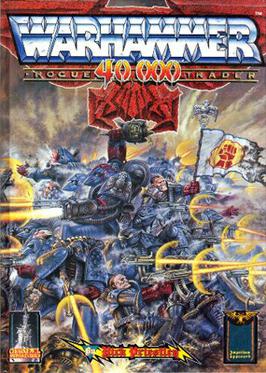 Parenting holds many joys and introducing my kids to games from my younger days is pretty high on the list.
Parenting holds many joys and introducing my kids to games from my younger days is pretty high on the list. Thursday, as my wife took my youngest to ballet, I decided to introduce my older kid to Rogue Trader, a game I first met in college.
No, not THIS Rogue Trader ... not the Fantasy Flight RPG set in "the grim darkness of the 41st millennium."

THIS one ... a very campy, tongue-in-cheek, skirmish-level wargame from 1987! Not even remotely self-conscious, Priestley alternates between shamelessly ripping off cool ideas from sources like Star Wars and lampooning those same sources.
The predecessor to Warhammer 40,000, Rogue Trader is more of a hobbyist's labor of love than a finished product (designed in turn to promote other products). Basically it is a tool kit for building your own science fiction (or more accurately, futuristic fantasy) wargames with whatever ideas, models, and spare bits you happen to have.
I took on the role of an Imperial Guard lieutenant Terrell, tasked with holding a tiny, rustic, backwater fort against an incursion of dread Space Orks. For her part, my daughter had two mobs of orks, out for conquest, mayhem, and bloodshed!

Orks of the Toe Cheez clan throw themselves against the stockade walls, blasting away at the human defenders.

Meanwhile, another mob of orks creep up through the nearby ruins of a forgotten civilization, intent on using their comically-oversized missile launcher to put the hapless guardsmen in a crossfire.
But what's this?! A squad of Imperial Space Marines appears to the west and marches to relieve the fort.
Led by a caped and hooded Inquisitor (after the squad sergeant was vaporized by a lucky shot from an ork plasma gun), the armor-clad space marines arrive at the stockade walls and rout the surviving aliens.
My daughter enjoyed the clash as evidenced by the fact that she immediately wanted to reset the terrain and have another go. We played four small battles over the next day, tinkering about with adding weapons, clarifying cover and reserve rules, and discussing a better way to resolve close combat.
Rogue Trader benefits from what it lacks: a canonical setting, official army lists, and any sense of gravitas. Instead it invites customization and a DIY approach to building the game that you want to play. In that regard it reminds me quite a bit of J. Eric Holmes 1977 Basic D&D.


No comments:
Post a Comment